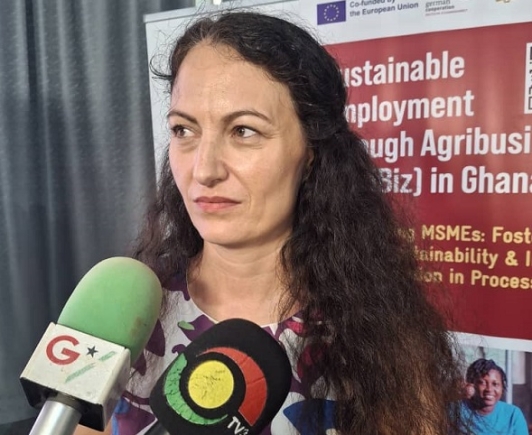
Ghana's agribusiness sector poised for growth — Trade Ministry
The Ministry of Trade, Agribusiness, and Industry has praised the impact of the sustainable employment through business (agribusiness) programme, implemented by GIZ Ghana, in transforming the sector.
Speaking at the closing ceremony of the project in Accra, Director for Agribusiness at the ministry, Kwame Oppong Ntim, stated that the programme's achievements, including the establishment of a comprehensive monitoring and evaluation framework, stakeholder ecosystem mapping, and support for 14 business organisations, including associations of women, youth, exporters, and farmers.
"The activities carried out by Agribusiness are phenomenal," Ntim said. "This includes a comprehensive monitoring and evaluation framework and a stakeholder ecosystem mapping, among others. "Together, these tools have guided the Ministry and need to continue to guide the Ministry and its partners in translating policy into action, ensuring coordinated, effective, and measurable support for Ghana's MSME developments with lasting impact," he said.
Mr Ntim explained that a vibrant private sector, depends on strong, well-organised business associations that could effectively represent members, deliver quality services, and advocate for an enabling business environment.
"The vibrant private sector depends on strong, well-organized business associations that can effectively represent members, deliver quality services, and advocate for an enabling business environment.
"And through agribusiness, the ministry has supported 14 business organisations, including associations of women, youth, exporters, and farmers, to strengthen their institutional capacities and sustainability," he said.
Inclusive contract farming
The programme has also promoted inclusive contract farming, linking farmers directly with industry through transparent and sustainable agreements.
"Inclusive contract farming has proven to be a practical model for linking our farmers directly with industry through transparent and sustainable agreements.
"It is a key driver of agricultural value chain development and inclusive growth, providing farmers with stable markets, fair prices, and access to quality inputs and modern techniques," he said.
Mr Ntim expressed gratitude to GIZ Ghana and other partners for their support, noting that the programme's impact will be sustained through the ministry's continued efforts to promote agribusiness development.
"We must also note that inclusive contract farming has proven to be a practical model for linking our farmers directly with industry through transparent and sustainable agreements.
"We will continue to promote certification, strengthen institutional support and data systems, and ensure that our businesses meet the standards required for global competitiveness," he said.
Critical sector
The Commission Manager of AgriBiz programme, Sarah Rüffler, stated that agribusiness was a critical sector for job creation, employing over 80 per cent of the population.
However, she said that only 20 per cent of Ghana's produce is processed locally, indicating a significant potential for job creation and economic growth.
"Agribusiness has always been one of the most important topics to tackle when it comes to job creation.
"Not only because agribusiness employs more than 80 per cent of the population, but also because there are challenges remaining, particularly when it comes to value addition," he said.
Mr Rüffler explained that access to finance was a major challenge for micro, small, and medium enterprises (MSMEs) in the agribusiness sector, particularly for women in northern Ghana.
To address this, he said AgriBiz supported the setup of village savings and loans associations, benefiting over 15,000 women.
"We have learned that there are major challenges for instance when it comes to access to finance.
"We also found out that our beneficiaries found it very helpful that we could help them and support them to improve the quality of their bookkeeping, for instance, so that subsequently they would be eligible for new financing opportunities," he said.
The Deputy Head of Development Cooperation at the German Embassy, Daniel Bohme, said the AgriBiz has made significant contributions to transforming the agricultural landscape in Ghana, fostering inclusive growth, creating jobs, and empowering women across the value chain.
"We remain committed to sustaining these gains and building on the strong partnerships anc innovations established under the programme," Mr Bohme said.
The event
On the theme: "Celebrating AgriBiz impact and partnerships," the event brought together key stakeholders from the public and private sectors as well as civil society, highlighting collaboration for agribusiness development.
It showcased the transformative impact on innovation, women economic empowerment and quality agricultural production.
Implemented in close collaboration with the Ministry of Trade, Agribusiness and Industry and the Ministry of Food and Agriculture, AgriBiz is commissioned by the German Federal Ministry for Economic Cooperation and Development (BMZ) and co-funded by the European Union
Through collaboration with its partners, the programme has supported over 17,000 smallholder farmers with embedded services, while strengthening the supply chain management of 37 agribusiness companies through the facilitation of inclusive contract farming models.
Quality standards have improved both at the farm and processing levels, with 40 agribusinesses and more than 5,500 outgrower farmers receiving support to obtain certification in sustainability standards.
Additionally, the companies were assisted to enhance their export readiness, quality production, and traceability, as well as to explore new market opportunities in Europe and North America.